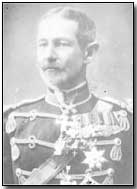Who's Who - Alexandru Averescu
 Alexandru Averescu (1859-1938)
is widely credited as Romania's most successful First World War commander;
he also served as his country's Prime Minister for a month in February 1918.
Alexandru Averescu (1859-1938)
is widely credited as Romania's most successful First World War commander;
he also served as his country's Prime Minister for a month in February 1918.
First and foremost a military commander, Averescu's wartime service dated back to involvement in the War of Independence against Turkey in 1877-78. After a period spent studying military theory in Italy Averescu returned home to take up a related position within the Romanian cabinet, as Minister of War.
During the Second Balkan War in 1913 Averescu served as army Chief of Staff. With the outbreak of war in Europe the following year Romania declared a policy of neutrality. In August 1916 however she finally entered the war against the Central Powers. Averescu was immediately given an active field command, leading Third Army, charged with defence of the southern border with Bulgaria.
The following month Averescu was given charge of Army Unit South and took it into action against combined Bulgarian and Turkish forces across the Danube at Flamanda in late September; ultimately with disastrous results with the consequence that his forces were routed.
Averescu's military reputation did not suffer for long however. Responsible for defensive operations in the Carpathians, and in the defence of Foscani in August 1917, Averescu led his forces with distinction, earning widespread popular acclaim at home.
When Ion Bratianu resigned as Prime Minister in February 1918 the King, Ferdinand I, appointed Averescu in his stead. The latter was tasked with negotiating a settlement with Germany. Dissatisfied with the results - the Treaty of Bucharest (which Ferdinand declined to sign) - the King forced Averescu from office, although Averescu again served as Prime Minister in the autumn.
After the war Averescu was responsible for establishing the People's League political group which triumphed in Romania's 1920 elections. He subsequently served twice more as Prime Minister: from 1920-21 and again from 1926-28.
Promoted Field Marshal in 1930, Averescu was made a member of the Crown Council by King Carol II in 1937. He died the following year.
A 'corkscrew' was a metal post for supporting a wire entanglement, with a twisted base enabling it to be screwed into the ground, removing the need for a hammer, the use of which could attract enemy fire.
- Did you know?
